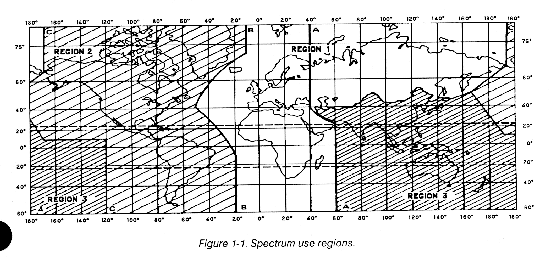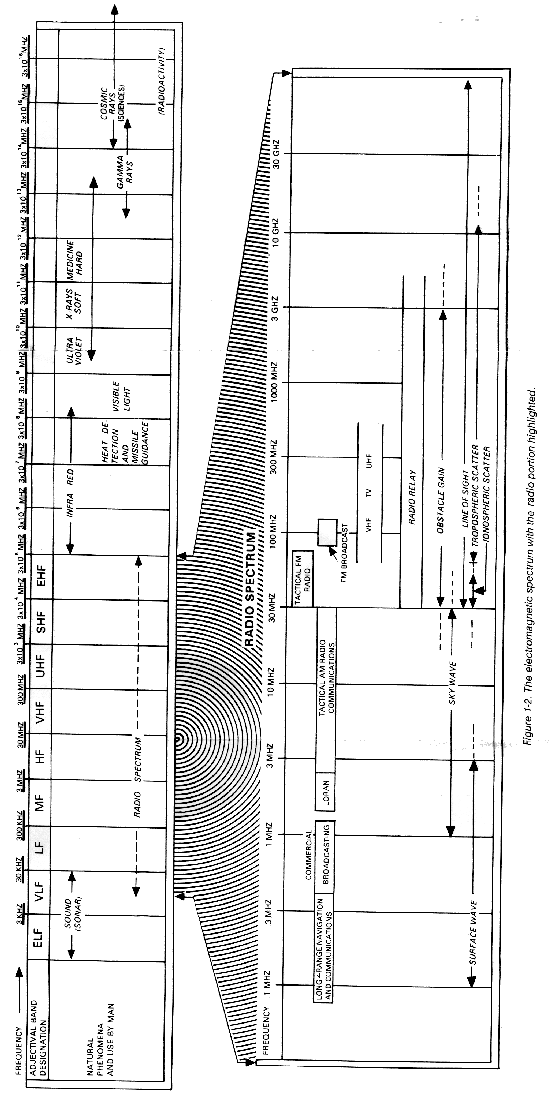Chapter 1
International Spectrum Management
1-1. Introduction
All nations share the electromagnetic spectrum and reserve their right to its unlimited use. However, for international telecommunications cooperation to support trade, transportation, communications, and mutual protection against interference, they have agreed to an International Telecommunications Convention. This serves as the basic instrument of the International Telecommunications Union (ITU) and its supporting bodies. This chapter covers this organization and relationship with the US.
1-2. The ITU
The United Nations recognizes the ITU as the specialized agency in the telecommunications field. The ITU maintains cooperation to improve all telecommunications. The ITU allocates the international radio frequency (RF) spectrum, registers frequency assignments, and coordinates resolving interference. Upon ratification by member nations, ITU regulations have treaty status. Each ITU member nation imposes regulatory measures within its administration. These measures must comply with the current Radio Regulations (RR) unless expressly excluded by either footnotes or by special arrangements.
1-3. The ITU Organization
The Plenipotentiary Conference is the supreme agency of the ITU. It formulates general policies, establishes budgetary guidelines, elects members, and concludes agreements between the ITU and other international communications organizations. The ITU has three organizations or agencies that directly affect Army spectrum management: the World Administrative Radio Conference (WARC), the International Frequency Registration Board (IFRB), and the International Radio Consultative Committee (CCIR).
A WARC may deal with all of the radiocommunications services, or it may deal with specific radiocommunications services such as space, maritime, or aeronautical. Each WARC updates the RRs which allocate radio spectrum use on a worldwide basis except where regional requirements differ and are agreed. Figure 1-1 shows the three recognized regions. In addition, the tropical area centered on the equator has additional provisions to offset its higher electrical noise. Figure 1-2 shows all the uses of radio spectrum that are managed by services. Exceptions to these allocations may be footnotes for specific countries or reservations made by that country at the WARCs.
The IFRB records ITU member nation frequency assignments. It advises the WARCs and member nations on technical matters on harmful interference and radio spectrum use. The IFRB serves as the office of record of frequency assignments in priority and adjudicates interference conflicts among member nations.
The CCIR provides technical criteria on frequency sharing and examines technical and operational questions about international radio use. It also addresses technically related questions pertinent to ITU member nations and forthcoming WARCs. The findings of the CCIR serve a significant influence on the state-of-the-art and as a basis for RRs. However, these findings are recommendations rather than having an obligatory treaty status. The CCIR is organized into study groups. The United States Study Groups (USSGs) submit their investigations or findings through the National Committee. This is described in the next paragraph. In addition to study groups on radio propagation, the Army is concerned with the study group on the mobile radiocommunications services.
1-4. The Department of State
Bilateral and multilateral negotiations and agreements concerning telecommunications and spectrum use are essential to foreign relations. The Department of State is responsible for such negotiations. It also reviews and directs the US positions using personnel and experts in government, industry, and academic fields. It also relies on the recommendations of the National Telecommunications and Information Administration (NTIA), the Federal Communications Commission (FCC), other government agencies, and private sector organizations when designating delegations to international or regional ITU conferences or meetings. The State Department governs US participation in the CCIR, and it chairs a United States National Committee (USNC). The USNC consists of representatives of federal government agencies with a vested interest in telecommunications. The USNC gives final approval on all US contributions to the CCIR. USSGs have been set up by charter to review foreign contributions to the CCIR. This review helps US delegations prepare summaries, critiques, and impact assessments for international meetings.
|
NEWSLETTER
|
| Join the GlobalSecurity.org mailing list |
|
|
|



